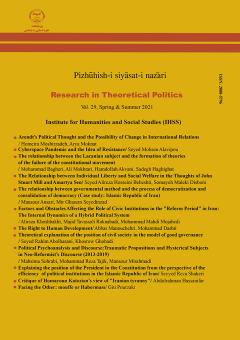The Relationship between Individual Liberty and Social Welfare in the Thoughts of John Stuart Mill and Amartya Sen
Subject Areas : Research in Theoritical Politics
seyed alireza Hoseyni Beheshti
1
![]() ,
somaye Maleki Dizboni
2
,
somaye Maleki Dizboni
2
1 - Assistant Professor, Department of Political Science, Tarbiat Modares University, Iran.
2 - Ph.D. student in Political Thought, Ferdowsi University of Mashhad, Iran.
Keywords: John Stuart Mill, Amartya Sen, Individual liberty, Utilitarianism, Capability Approach,
Abstract :
One of the fundamental issues in contemporary political and economic thought concerns the relationship and consistency between one’s social duties and personal liberties, and different schools have suggested their views on the matter. From a normative point of view, arguments offered by modern reformist liberalism have attracted more attention in this respect. The positions of John Stuart Mill, as one of the pioneers and influential, and Amartya Kumar Sen as one of the most recent liberal reformists with respect to the idea of welfare, have been at the center of attention for several decades. Here we discuss and analyze the relationship of the concepts of individual liberty and social welfare as argued by them by employing a comparative approach, in order to provide a more elaborate picture of such a relationship. It is shown here that albeit using different methods and approaches, they share similar theoretical starting points and goals on the matter. For Mill, the liberty of the individual and society is viewed as a vital means for achieving happiness. While Mill employs a utilitarian approach to human happiness, offering a critique on utilitarianism and focusing rather on the capability approach, Sen holds that individual and social happiness would best be achieved through providing equal opportunities for free choice for the members of the society. A closer look at the arguments offered by Mill and Sen indicates that, based on the concept of the free and informed modern subject, they both believe that social and political development will improve an individual and social happiness will be better achieved by focusing on individual liberties.
آرون، ریمون (1382) حقیقت و آزادی، مهرداد نورایی، تهران، مروارید.
آربلاستر، آنتونی (1367) ظهور و سقوط لیبرالیسم غرب، عباس مخبر، تهران، مرکز.
اسکینر، کوئنتین (1390) آزادی مقدم بر لیبرالیسم، فریدون مجلسی، تهران، فرهنگ جاوید.
الوی، جیمز (1384) «تاریخچه¬ای از علم اقتصاد در جایگاه علمی اخلاقی»، ترجمه علی نعمتی، مجله اقتصاد اسلامی، شماره 19، صص151-180.
برلین، آیزایا (1368) چهار مقاله دربارۀ آزادی، ترجمه محمدعلی موحد، تهران، خوارزمی.
پریندرگست، رنی (1386) «آزادی و توسعه»، ترجمه علی¬اصغر صباغی، مجله راهبرد یاس، شماره 11، صص 123-148.
دوتوکویل، الکسی (1347) تحلیل دموکراسی در آمریکا، رحمت¬الله مقدم مراغهای، تهران، زوار.
دین، هارتلی (1388) سیاست¬گذاری اجتماعی، عبدالله بیچرانلو، تهران، پژوهشکده مطالعات فرهنگی و اجتماعی.
سن، آمارتیا (1379) آزادی و برابری، ترجمه حسن فشارکی، تهران، شیرازه.
--------- (1390) اندیشه عدالت، ترجمه وحید محمودی و هرمز همایون¬پور، تهران، آگاه.
--------- (1394) توسعه به مثابه آزادی، ترجمه وحید محمودی، تهران، دانشگاه تهران.
صانعی دره¬ بیدی و مهران رضایی (1388) «پژوهشی در مسئله¬ آدام اسمیت (سازگاری یا ناسازگاری نظام اخلاقی و اقتصادی اسمیت)»، دوفصلنامه¬ فلسفی شناخت، پاییز و زمستان، شماره 61/1، صص 77-120.
گری، جان (1379) فلسفه سیاسی جان استوارت میل، ترجمه خشایار دیهیمی، تهران، طرح نو.
-------- (1381) لیبرالیسم، ترجمه محمد ساوجی، تهران، وزارت امور خارجه.
منوچهری، عباس (1385) «آزادی در روایتی پارادایمی»، پژوهشنامه علوم سیاسی، شماره 2، صص 7-27.
موسوی، میرطاهر ومحمدعلی محمدی (1388) مفاهیم و نظریه¬های رفاه اجتماعی، تهران، دانژه.
میل، جان استوارت (1375) رسالۀ درباره آزادی، ترجمه جواد شیخ¬الاسلامی، تهران، علمی و فرهنگی.
-------------- (1388) فایده¬گرایی، ترجمه مرتضی مردیها، تهران، نی.
-------------- (1389) حکومت انتخابی، ترجمه علی رامین، تهران، نی.
نوزیک، رابرت (1395) بی¬دولتی، دولت، آرمان¬¬¬شهر، ترجمه محسن رنجبر، تهران، مرکز.
هایک، فردریش فون (1392) قانون، قانون¬گذاری، آزادی، جلد2: سراب عدالت اجتماعی، ترجمه مهشید معیری و موسی غنی¬نژاد، تهران، دنیای اقتصاد.
Bishop, P (2007) Three Theories of Individualism, Graduate Theses and Dissertations, https:// Scholarcommons.usf.edu/etd/636.
Dean, H (2009) Critiquing Capabilities, the distraction of a beguiling concept, Critical Social Policy, 29 (2). pp. 261-273.
Farrelly, C (2004) Introduction to Contemporary Political Theory.SAGE Publications Ltd.
Hinsch, w (2011) Ideal Justice and Rational Dissent, A critique of Amartya Sen's The Idea of Justice, Analyse & kritik, 33(2). pp. 371-386.
Helliwell, J. , Layard. R. and Sachs. J. , eds. (2013)World Happiness Report 2013 , https://worldhappiness.report/ed/2013/.
Nussbaum, M (2007) Frontiers of Justice. Harvard University Press.
Valentini, L (2010) A Paradigm shift in Theorizing about Justice? A Critique of Sen, CSSJ Working Papers Series, SJ011 November2010. 1-14.


